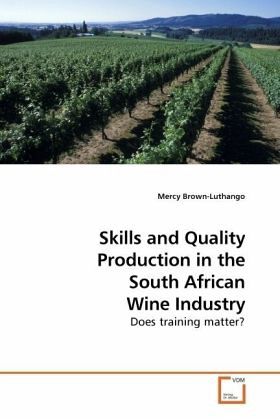
Skills and Quality Production in the South African Wine Industry
Does training matter?
Versandkostenfrei!
Versandfertig in 6-10 Tagen
52,99 €
inkl. MwSt.

PAYBACK Punkte
26 °P sammeln!
There is a general consensus amongst industry experts that in order for the South African wine industry to sustain the success it has enjoyed thus far in export markets like the United Kingdom, the Netherlands and Sweden and to become even more internationally competitive, it has to improve the quality of its wine and move into higher price categories of the wine market. Skills training has been highlighted as a significant component of a strategy to improve the quality of South African wine. The book argues that although there has been a general upgrading of skills in relation to new vineyard...
There is a general consensus amongst industry experts that in order for the South African wine industry to sustain the success it has enjoyed thus far in export markets like the United Kingdom, the Netherlands and Sweden and to become even more internationally competitive, it has to improve the quality of its wine and move into higher price categories of the wine market. Skills training has been highlighted as a significant component of a strategy to improve the quality of South African wine. The book argues that although there has been a general upgrading of skills in relation to new vineyard practices for quality production, workers at the co-operatives and estates studied do not yet receive the kind of in-depth knowledge which the theory argues is necessary for the production of quality wine. The evidence suggests that in a country like South Africa, in the context of a legacy of low education and literacy levels amongst workers, repeated demonstration and strict supervision can compensate to a certain degree for a lack of in-depth knowledge and discretion amongst workers.












